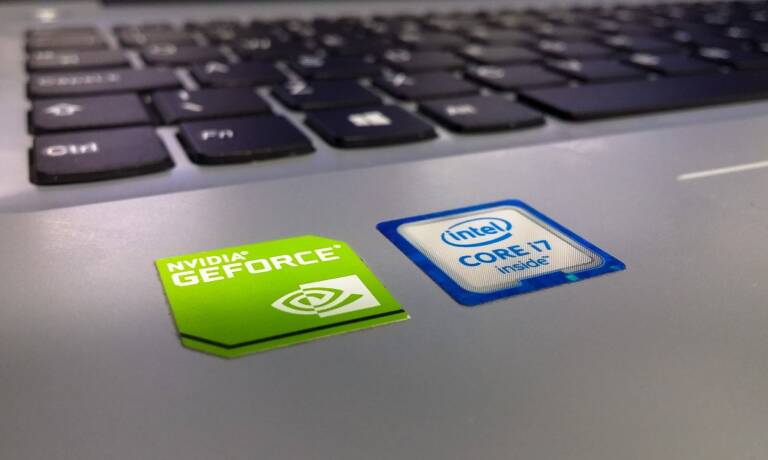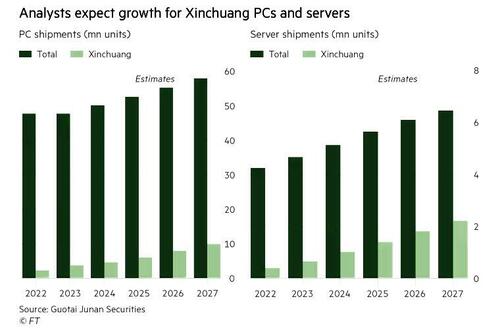China wants to progressively eliminate Intel, AMD and Microsoft from public administration and companies

After the United States took several measures to prevent Chinese companies from buying both Nvidia's latest AI chips and European semiconductor titan ASML from sending its advanced chip-making machines to Beijing , China has avenged by introducing new guidelines that will lead to the phasing out of US chips from Intel and AMD from government PCs and servers, as Beijing steps up a campaign to replace foreign technology with domestic solutions, the FT reported.
This escalation in the chip war between the two superpowers, in the form of stricter government purchasing guidelines, also aims to abandon Microsoft's Windows operating system and foreign-produced database software in favor of domestic options, and goes hand in hand with a parallel action to find state companies capable of meeting the necessary supplies.
According to the FT, the latest purchasing rules “represent China's most significant step to build domestic substitutes for foreign technology and echo moves by the United States as tensions between the two countries rise.” Over the past year, Washington has imposed sanctions on a growing number of Chinese companies on national security grounds, legislated to encourage technology manufacturing in the United States and blocked exports of advanced chips and related tools to China.
Chinese officials began following new guidelines for PCs, laptops and servers this year, after they were unveiled with little fanfare by the Ministry of Finance and the Ministry of Industry and Information Technology (MIIT). on December 26th. They order government agencies and party bodies above the municipal level to include criteria requiring “safe and reliable” processors and operating systems at the time of purchase.
On the same day in December, the state testing agency, the China Information Technology Security Evaluation Center, released the first list of “safe and reliable” processors and operating systems, all from Chinese companies.
Among the 18 approved processors were chips from Huawei and state-backed group Phytium. Both are on Washington's export blacklist. Chinese processor makers use a mix of chip architectures, including x86 from Intel, Arm and those developed in-house, while operating systems are derived from open-source Linux software.
The standards “are the first detailed and clear nationwide instructions for promoting Xinchuang,” said a local government official managing the replacement of IT systems.
Beijing's procurement revamp is part of a national strategy for technological independence in the military, government and state sectors, which has become known as xinchuang or "IT application innovation." State-owned enterprises have similarly been told by their watchdog, the State-owned Assets Supervision and Administration Commission, to complete the technology transition to domestic suppliers by 2027, according to two people briefed on the matter. Since last year, state groups have begun submitting quarterly reports on progress made in revamping their computer systems, although some foreign technology may remain, the people said.
The creeping ban on US-made hardware and software means that American companies in China will be hit, starting with the world's dominant PC processor makers, Intel and AMD. China was Intel's largest market last year, providing 27% of its $54 billion in sales and 15% of AMD's $23 billion. Microsoft does not break down sales in China, but President Brad Smith told the US Congress last year that the country provided 1.5% of revenue.
It may be difficult for Intel or AMD to get on the list of approved processors. To be evaluated, companies must submit complete R&D documentation and code for their products. The main criterion for evaluation is the level of design, development and manufacturing completed within China, according to a notice from the state testing agency.
However, like most regulations in China, this one is bound to be broken. As the FT reveals after speaking to two provincial-level procurement officials, there is some leeway left to purchase computers with foreign processors and Microsoft Windows. But the transition is certainly underway: Lao Zhangcheng, responsible for purchasing 16 all-Chinese computers for an organization under the Shaoxing City Transportation Bureau, said his colleagues had no choice but to get used to it. to national operating systems.
“We are replacing old computers with foreign chips,” Lao said. “After this purchase, virtually all office employees will have a national computer. The old computers we have left with Windows systems can still be used in certain situations."
A problem that may arise for Microsoft is that with a potential future customer base of 1.2 billion people we will have an explosion of Linux interfaces that will be developed to replace Microsoft operating systems, with the risk that, given that Linux itself can also be used in the West, these will then also filter into our markets, displacing the Seattle company. A problem that American protectionists had not considered.

Thanks to our Telegram channel you can stay updated on the publication of new Economic Scenarios articles.
The article China wants to progressively eliminate Intel, AMD and Microsoft from public administration and companies comes from Economic Scenarios .
This is a machine translation of a post published on Scenari Economici at the URL https://scenarieconomici.it/la-cina-vuole-eliminare-progressivamente-intel-amd-e-microsoft-da-pubblica-amministrazione-e-aziende/ on Mon, 25 Mar 2024 16:04:16 +0000.

